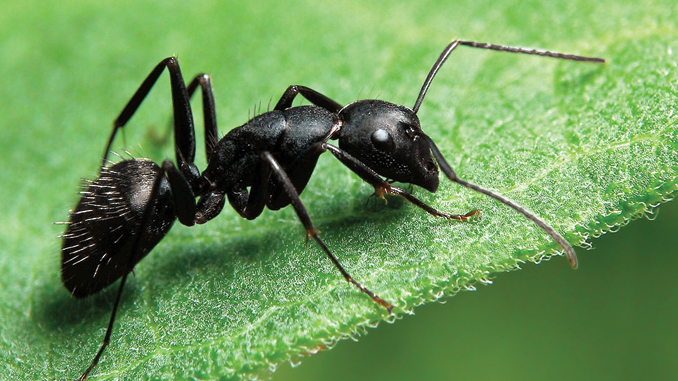Do ants sleep?
Ants never rest, or so it seems. You never see them taking a break or wandering drowsily along. Ants’ nonstop behavior might spur the questions, do ants sleep?, and if so, what are the sleep habits of ants? How much do ants sleep? A new study by researchers at the University of South Florida in St. Petersburg that was published in the Journal of Insect Behavior has shed new light on the sleeping habits of ants.
It turns out that ants do sleep, and some of them even appear to dream. Worker ants, long used as symbols of industry and efficiency, survive on the insect equivalent of hundreds of tiny naps a day as they go about their endless work. Their queens, on the other hand, routinely sleep for as much as nine hours a day.
Researcher Deby Cassill, along with coauthors Skye Brown, Devon Swick and George Yanev, conducted the first research project to answer the question “Do ants sleep?” Cassill and her associates focused on the fire ant, known to scientists as Solenopsis invicta.
Worker ants are easily replaced by others that are indistinguishable from them. Creating a new queen, on the other hand, requires a considerable commitment of time and effort on the part of the colony. Fire ant queens live for years, while the lifespan of a worker is measured in months. Cassill and her team of researchers speculated that the poor sleeping habits of the worker ants could be part of the cause of their dramatically shorter lifespans.
However, the worker ants’ habit of grabbing quick power naps when time allows helps to protect and preserve the ant colony. Refraining from long periods of sleep each day keeps worker ants ready to defend the colony and tend to its needs around the clock.
The researchers created an artificial, glass-enclosed colony in the laboratory and equipped it with cameras that tracked every move of the colony. This provided researchers with a fascinating reality show starring three queens and thirty worker ants, as well as 30 larvae.
Cassill and her team expected to find that the ants, which live beneath the ground, followed schedules that had nothing to do with the cycles of light and darkness that rule the sleeping and waking patterns of most surface-dwellers. Their hypothesis proved to be correct. They discovered that the workers followed an irregular sleeping pattern, with each individual worker napping at odd times throughout the day and night. Workers slept slightly longer than minutes each nap, but took an average of 250 of these tiny naps for a total of nearly five hours of sleep per day.
The workers did not sleep in groups, and rarely did the researchers observe more than 20 percent of the workers sleeping at one time. However, when the workload slowed, the workers took advantage of this by taking more frequent naps.
Queens, which are necessary for the survival of the colony and are difficult to replace, have very different sleep habits. Compared to the worker ants, the three queens studied in the project maintained a more regular schedule. In fact, the queens all slept at the same time, piling on top of each other like puppies in a litter and then separating when they awoke.
The queens slept about six minutes at a time, 90 times each day. The queens’ took two different types of naps. One type of nap resembled a light doze. During these dozes, the queens’ antennae remained partly raised and their mouths stayed open. A worker ant or the movement of another queen could easily awaken a queen who was merely dozing.
Some of the queen ants’ naps seemed to be much deeper. During these deeper naps, the queens’ antennae would retract and their mouths would close. Often, the queens appeared to be dreaming, exhibiting antenna movement that the researchers speculated might equate to eye movements that indicate the dream stage of sleep in mammals.
Much of sleep’s purpose is still a mystery. However, the way an ant colony is set up suggests that sleep is necessary for the health and longevity of the queens. Ironically, the very need to keep the queen well rested means that the worker ants are not allowed the same luxury.
According to Cassill, “Workers are a disposable caste whose job is to buffer the queen and her royal offspring from agents of death like exposure, starvation and predators. It is the workers who engage in the high risk behavior, thus the queen lives a long life.”
Although some ant species’ queens can live up to 45 years, fire ant queens typically live for six years and usually die of old age. Workers, on the other hand, are often killed in work-related accidents and are fortunate to survive a year before succumbing to old age.
Hi! I am a robot. I just upvoted you! I found similar content that readers might be interested in:
http://www.pestnet.com/ants/do-ants-sleep/
Congratulations @zakariya12345! You have completed some achievement on Steemit and have been rewarded with new badge(s) :
Click on any badge to view your own Board of Honor on SteemitBoard.
For more information about SteemitBoard, click here
If you no longer want to receive notifications, reply to this comment with the word
STOP